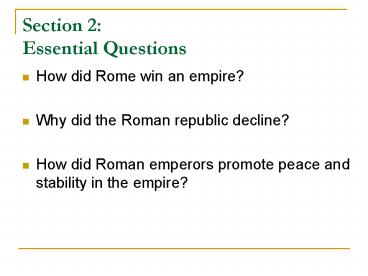Section 2: Essential Questions PowerPoint PPT Presentation
1 / 18
Title: Section 2: Essential Questions
1
Section 2 Essential Questions
- How did Rome win an empire?
- Why did the Roman republic decline?
- How did Roman emperors promote peace and
stability in the empire?
2
Section 2 From Republic to Empire
- Carthage
- City-state on the northern coast of Africa
- Settled by North Africans and Phoenician traders
- Ruled over an empire that stretched across North
Africa and the western Mediterranean
3
Wars with Carthage
- First Punic War
- Rome defeated Carthage and won Sicily, Corsica,
and Sardinia - Second Punic War
- Hannibal, Carthaginian general, led his army
including dozens of war elephants, on an epic
march across the Pyrenees, through France, and
over the Alps into Italy. - Carthage gave up all its lands except those in
Africa.
4
Wars with Carthage, contd
- Third Punic War
- Rome completely destroyed Carthage.
- Survivors killed or sold into slavery.
- Romans poured salt over the earth so nothing
would grow there again.
5
Other Conquests
- Imperialism
- Establishing control over foreign lands and
peoples - Romans confronted the Hellenistic rulers who
divided up the empire of Alexander the Great. - Provinces
- Lands under Roman rule
- 133 B.C. Roman power extended from Spain to Egypt.
6
Social and Economic Effects
- Conquests and control of busy trade routes
brought incredible riches into Rome. - Generals, officials, and traders amassed fortunes
from loot, taxes, and commerce. - Latifundia? huge estates bought up by newly
wealthy Roman citizens. - Forced people captured in war to work as slaves
- Widespread use of slave labor hurt small farmers.
- Many farmers fell into debt and had to sell their
land.
7
Social and Economic Effects, contd
- Landless farmers flocked to Rome and other cities
looking for jobs. - Gap between poor and rich widened
- New wealth increased corruption
8
Attempts at Reform
- Tiberius and Gaius Gracchus
- Young patrician brothers
- Among the first to attempt reform
- Tiberius, tribune, called on the state to
distribute land to poor farmers - Gaius, tribune 10 years later, sought a wider
range of reforms - Use of public funds to buy grain to feed the poor
- Killed in waves of street violence set off by
senators and their hired thugs.
9
Decline of the Republic
- Rome was plunged into a series of civil wars
- Senate
- Wanted to govern as it had in the past
- Popular political leaders
- Wanted to weaken the senate and enact reforms
- Turmoil sparked slave uprisings and revolts among
Romes allies
10
Julius Caesars Rise to Power
- Ambitious military commander
- Completed the conquest of Gaul now France
- Veni, vidi, vici
- Forced the senate to make him dictator
- Absolute ruler of Rome
11
Caesars Reforms
- Public works to employ the jobless
- Gave public land to the poor
- Reorganized the government of the provinces
- Granted Roman citizenship to more people
- Julian calendar? Introduction of a new calendar
based on Egyptian knowledge still our calendar
today (with minor changes).
12
Assassination
- Caesars enemies worried that he planned to make
himself king of Rome - Plotted against him to save the republic
- March 44 B.C. enemies stabbed him to death in the
senate
13
Civil Wars
- Caesars death plunged Rome into a new round of
civil wars - Mark Antony
- Caesars chief general
- Octavian, Caesars grandnephew
- Joined forces to track down the murderers
- Quarreled, Octavian defeated Antony and Cleopatra
14
Roman Empire and Roman Peace
- Octavian received the title of Augustus, or
Exalted One - Declared him princeps, or first citizen
- Exercised absolute power and named his successor
- Created an efficient well-trained civil service
to enforce the laws - High level jobs open to talented men, regardless
of class - Cemented the allegiance of cities and provinces
to Rome by allowing them a large measure of
self-government.
15
Augustus
- Ordered a census, population count, to make the
tax system fair - Set up a postal service
- Issued new coins to make trade easier
- Jobless worked on building roads and temples and
farmed the land
16
Bad Emperors and Good Emperors
- Caligula
- Appointed his favorite horse as consul
- Nero
- Viciously persecuted Christians and wan even
blamed for setting a great fire that destroyed
much of Rome - Hadrian
- Codified Roman law built a wall across Britain
to hold back attackers - Marcus Aurelius
- Philosopher-king stoic philosophy and commitment
to duty
17
The Pax Romana
- Roman Peace
- 200 year span that began with Augustus and ended
with Marcus Aurelius - Roman rule brought peace, order, unity, and
prosperity to lands stretching from the Euphrates
River in the east to Britain in the west.
18
Bread and Circuses
- Circus Maximus
- Romes largest racecourse
- Chariot races
- Gladiator contests
- Slaves trained to fight
- Good fighter could win his freedom
- Government provided free grain to feed the poor

